Overview of religious life in the period of Independence
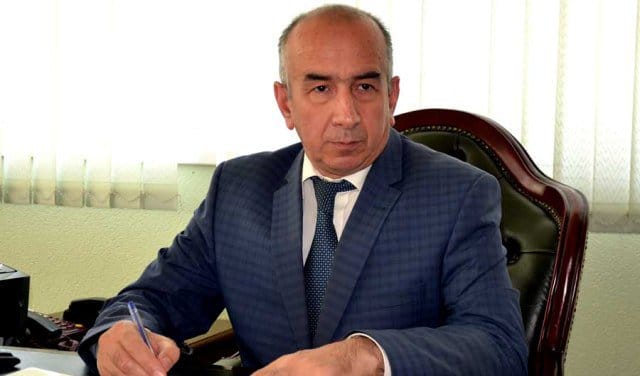
Dushanbe, 22.07.2016. /NIAT «Khovar»/. The achievement of national independence in Tajikistan had radically changed the ideological, political and structural platforms of the official attitude towards religion. Disruption of the planned economy had reduced the influence of Marxism-Leninism ideology and academic atheism. In all post-Soviet republics a deep economic crisis and the political vacuum had occurred. In such disintegrated situation every country had to determine the future path of its development. In Tajikistan, three major forces i.e. the state power at that time, national intellectuals and extremist clerics entered into the political arena struggle.
1. Background
It is clear thatany transition requires to create the appropriate infrastructure, includingthe religious life. At the very beginning of the our independence there were only 17 mosques in Tajikistan,which were not functioning properly. Political problems and the troubled security situation –internal civil war and the troubled situation in Afghanistan have not been able to adapt to new conditions.During 1992-1997 years, the country’s political leadership was able to eliminate the consequences of the civil war and to organize social political and religious lifesbased onthe secular state laws. As a result, “the General Agreement on the Establishment of Peace and National Accord in Tajikistan” was signed.
2. Measures
Tajik State and Government has adopted a number of normativeregulatory laws in order to regulate the religious organizations and citizen’s religious life and structural institutions were formed. For the coordination of religious life processes, education and research issues of religious and Islamic Studies several institution and organizations such as Committee on Religious Affairs, Regulation of Traditions and Ceremonies under the Government of Tajikistan, Islamic center under the President of the Republic of Tajikistan, the Islamic Ulema Council, Islamic Institute named after Imam Abu Hanifaand High Religious Schools were established.
To ensure the constitutional rights of citizens there took place the recreating and building of religious associations, mosques, schools, renovation of holy places and its was recognized as the beginning of a new cycle in civil society.
3. Current Situation: achievements, challenges, threats
- Аchievements
Publishing of the samples of academic and educational religious literature became an important issue. Firstly, primary sourceswere published in the form of small booklets. They were required for creating the correct interpretation of the main religious necessities. Further, the government has taken the initiative to publish the Islamic sources. First important academic and religious sources, as «History of Tabari», «Khimiya-i saadat», «Ihyaulum al-din», «Masnavi-i Ma’navi», «Ravzatul-Safa» and a number of classic poets Divans were presented to the people. These measures played an important role in preventing political and Islamic extremism. Following the translated publication of the Holy Koran, hadiths and Imam Azam Abu Hanifa heritage were distributed to a wider audience, which contributed to the civil society stabilization.
Now suitable conditions for the celebration of national ceremonies and traditions, such as Newroz, Eid al-Fitr, Eid al-Azha, Mehrgon, Sada and other public holidays have been prepared. Anniversary celebration of 1310-th years birthday of Imam A’zam Abu Hanifa – the founder of tolerant Islamic mazhab in 2009 proves that Tajiks are culture-nation and guardian of religious values, and in their minds do not allow the elements of radicalism and religious extremism. Newroz celebration returning in the real life of the people provided the desired balance of national and religious values in Tajik civil society.
- Challenges
Policy reform of “perestroyka”had not completed even after the collapse of the Soviet Union. Currently, the great powers embody the ideological aspects of this policy in a new expression in the Middle East. The fight against extremism and terrorism turns into a powerful weapon of the ideology for enemy image creating. The main goal is to destabilize the military-political situation in the region has already been reached.In the context of the financial and economic crisis everywhere disaffected elements of society worldwideautomatically be influenced under ISIL paradise promises. The policy of the terrorist organization «Islamic State» revives the exotic idea of «murtaziqa» (mercenaries), which was widely used in early Islam. Unfortunately, some citizens and the younger generation from Tajikistan also involved in the military conflicts of the Arab countries by different ways.
- External threats
Now there is very large impact of external threats to the situation in our country. Extensive information exchange, study abroad, free access to money transfer and various ways to support extremist organizations contribute to the practical implementation of these threats. Distorted assessment of socio-political situation and religious freedom in our country by the foreign media can also be a threatening reason to destabilize the situation. It should be noted that the unstable political situation in Afghanistan remains a major factor of instability in the region and our country. Engaging of our migrant workers into the ranks of extremist organizations by foreign emissaries also becomes very dangerous.
- Internal threats
At the same time there are some problems and internal threats. Until now, the religious literacy of the population does not meet modern requirements. Students studying in foreign religious high institutes take the initiative for the diffusion of new hostile religious ideas in order to manipulate the ideological sphere and reduce the impact of national values and traditions. Involvement of young generation into the religious terrorist organizations creates a true threat for the stability and religious unity.
4. Conclusion
The position of the President and the Government of the Republic of Tajikistan in relation to the Islamic religion is very friendly. Islam has nothing to do with terrorism. The fight against terrorism is not meaning a fight against Islam. Terrorism has no religion, nation, faith and homeland. Tajik national culture intertwined with religious values, divide and oppose them to each other would be a big mistake. The Tajik government is doing everything possible to preserve the ethnic, cultural and religious identity of its citizens.
Republic of Tajikistan in this difficult situation is relying on the experience of peace and the concept of national unity. We feel that the global and regional powers are refused in the implementation of its policy for financial and military support of the religious wars as a key factor in the maintenance of conflict in the Middle East region. The continuation of this process influences to the religious situation in the Muslim communities and can undermine their coexistence at any moment. Based on the given situation we use all available capabilities for the protection of national interests, lasting peace, stability and sustainable economic and social development in the Republic of Tajikistan.
Faizullo BAROTZODA,
Director of Islamic Studies Center under
the President of the republic of Tajikistan










 Sheep of the Hissor Breed Are Originally Tajik and Considered the Largest in the World
Sheep of the Hissor Breed Are Originally Tajik and Considered the Largest in the World President of Tajikistan Emomali Rahmon Answers Questions of Chinese Official Media on the Eve of the Winter Olympic Games
President of Tajikistan Emomali Rahmon Answers Questions of Chinese Official Media on the Eve of the Winter Olympic Games The Voice of the President of Tajikistan. The World Has Heard It and Should Collectively Support It!
The Voice of the President of Tajikistan. The World Has Heard It and Should Collectively Support It! TWENTY YEARS OF THE SCO: COOPERATION FOR STABILITY AND PROSPERITY. Article by the President of Tajikistan, Chairman of the Council of Heads of SCO Member States in 2021 Emomali Rahmon
TWENTY YEARS OF THE SCO: COOPERATION FOR STABILITY AND PROSPERITY. Article by the President of Tajikistan, Chairman of the Council of Heads of SCO Member States in 2021 Emomali Rahmon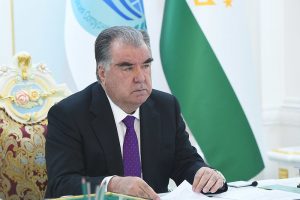 Rustam Haidarov: Emomali Rahmon Is One of the Architects of the Shanghai Cooperation Organization
Rustam Haidarov: Emomali Rahmon Is One of the Architects of the Shanghai Cooperation Organization Tajikistan’s Economic Development in 2021 Expected to Go Over 7%
Tajikistan’s Economic Development in 2021 Expected to Go Over 7% Elections: Opinions and Legal Validity
Elections: Opinions and Legal Validity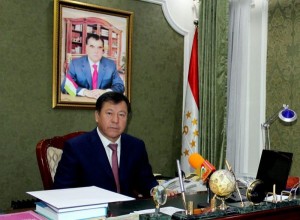 SCIENCE – BASIS OF SOCIETY DEVELOPMENT. In light of President Emomali Rahmon’s speech at a meeting with the country’s scientists on March 18
SCIENCE – BASIS OF SOCIETY DEVELOPMENT. In light of President Emomali Rahmon’s speech at a meeting with the country’s scientists on March 18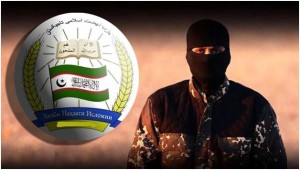 International Community Unconditionally Recognizes the IRP as a Terrorist Organization
International Community Unconditionally Recognizes the IRP as a Terrorist Organization Tajik Supreme Court Bans National Alliance’s Internet Sites
Tajik Supreme Court Bans National Alliance’s Internet Sites Tajikistan Ranks Second in the World in Terms of Cheap Electricity
Tajikistan Ranks Second in the World in Terms of Cheap Electricity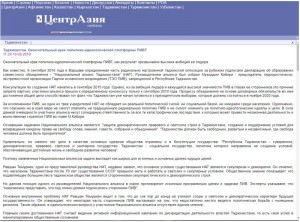 IRP’s Final Political and Ideological Collapse
IRP’s Final Political and Ideological Collapse













